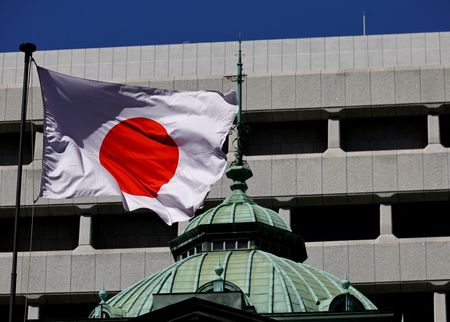SINGAPORE (Reuters) -Japanese shares surged to record highs on Monday, while the yen sank after fiscal dove Sanae Takaichi was elected to lead the ruling party and become the next prime minister.
Takaichi’s victory has raised chances that the Bank of Japan will avoid lifting interest rates this month, though the pause may not last if it batters the yen.
The Nikkei surged past the 47,000 level for the first time, while the yen weakened over 1.5% to hover near the psychologically important 150 per U.S. dollar.
Here are some comments from investors and analysts:
SHOKI OMORI, CHIEF DESK STRATEGIST, MIZUHO SECURITIES, TOKYO
“Market participants will be cautious about JP/US MOF to comment on the quick cheapening of yen. But there’s people still favouring short USD/JPY and I see those positions being closed. That will support USD/JPY level above, say 148. With the BOJ rates expectations fading and expected short term real yield being low and concerns about fiscal boost from Takaichi would also be support for higher USD/JPY.”
DAVID CHAO, GLOBAL MARKET STRATEGIST FOR ASIA-PACIFIC, INVESCO, SINGAPORE:
“Takaichi has previously voiced dovish views on monetary policy, criticising the BOJ for tightening while more recently reaffirming respect for the central bank’s independence. We do not expect her to oppose a potential BOJ rate hike at the end of October, which we continue to expect, though her leadership could limit the scope for further tightening in the future. This could lead to the JPY paring recent gains in the lead-up to the LDP election.”
ANINDA MITRA, HEAD OF ASIA MACRO STRATEGY, BNY INVESTMENT INSTITUTE, SINGAPORE:
“The uncertainty around fiscal objectives and an uptick in the odds of dominance over monetary policy are likely to result in more pain for the yen. To be sure, amid a weak U.S. dollar environment, we do not expect a sharply weaker bilateral exchange rate. But the JPY is likely to underperform other major FX-crosses until there is greater policy clarity.
“The near-term impact on Japanese government bonds is likely to be slightly (fleetingly) adverse. This is because much depends on Takaichi’s cabinet appointments and the actual course of her policies. For instance, the appointment of a conservative finance minister, from one of the traditional factions of the LDP, could allay some doubts about fiscal slippage.
“But efforts to provide immediate relief, in the year-end supplementary budget, against cost-of-living difficulties, could involve subsidies and tax credits to low-to-middle-income households which will be closely scrutinised by the markets.”
SHRIKANT KALE, SENIOR QUANTITATIVE STRATEGIST, JEFFERIES, HONG KONG:
“In the immediate term, the landscape is one of buoyant equities, a potentially weaker yen, and cautious bond markets, as investors adjust to the prospect of ‘Abenomics 2.0’ under Japan’s first female prime minister.”
MIKI DEN, SENIOR JAPAN RATE STRATEGIST, SMBC NIKKO SECURITIES, TOKYO:
“The outcome of the LDP election was the exact opposite of market expectations. The market had bet that Koizumi would win, and they were positioned for curve flattening. But because the bet on Koizumi was so strong, it will take time to unwind the flattening positions.”
CHARU CHANANA, CHIEF INVESTMENT STRATEGIST, SAXO, SINGAPORE:
“With policy unlikely to shift soon, the yen stays under pressure — not collapsing, but also not finding safe-haven demand unless there’s a shock. It remains the go-to funding currency in global markets.
“That keeps the yen as the preferred funding currency for carry trades, at least until we get closer to the 150–152 intervention zone.
“The policy continuity and weaker yen narrative should keep supporting Japanese equities, especially exporters and companies benefiting from inbound tourism and defence spending.”
HITOSHI ASAOKA, CHIEF STRATEGIST, ASSET MANAGEMENT ONE, TOKYO:
“The Nikkei was on course to reach as high as 48,000 by year-end, but because Takaichi was chosen as the LDP leader, it shot up toward that level already. The market welcomes her spending policy, but whether she can achieve that goal is not certain, as the LDP is still a minority party. The Nikkei may retreat once before year-end.”
TAKAMASA IKEDA, SENIOR PORTFOLIO MANAGER, GCI ASSET MANAGEMENT IN TOKYO:
“The market was lifted by a Takaichi surprise and when investors realise the reality, the momentum will fade. The hurdle for Takaichi to achieve her goal is high and she may be able to achieve perhaps only 10% or 20% of what she wants to do.”
ALEX LOO, MACRO STRATEGIST, TD SECURITIES, SINGAPORE:
“Knee-jerk reaction higher in USDJPY and Japan equities as her past views read to investors that she will ramp up fiscal spending and drive Japan back towards Abenomics. Investors are also discounting a BOJ move in October but we caution against this.
“The Tankan survey reflected favourable business sentiment and if branch regional managers feedback today also indicate that Japan is weathering through tariffs, the BOJ should continue with rates normalisation or risk falling further behind the curve. We don’t expect USDJPY to stay above 150 for long given US shutdown fears and the eventual compression in US-Japan rates differential.”
CHRIS WESTON, HEAD OF RESEARCH, PEPPERSTONE GROUP LTD, MELBOURNE:
“We know she’s a strong advocate of the Bank of Japan keeping policy on hold. We also look to the Trump administration [when considering central bank independence but] it’s the BOJ who has the loss of independence. The repricing we’ve been seeing does suggest that people bet she’ll have some influence on the BOJ thought process going forward.
“People are getting concerned about BOJ policy being behind the curve and they’ve left it quite late. Inflation is in a different spot in Japan. You could argue terminal pricing has been too low. If markets get a whiff that she’s going to do Abenomics-lite, it could keep bond buyers out of the market. She does need to tread a careful path if she goes down that road. She’ll be very cognisant of the UK’s example.”
(Reporting by Ankur Banerjee and Gregor Stuart Hunter in Singapore, Junko Fujita in Tokyo, Summer Zhen in Hong Kong; Editing by Sam Holmes)











